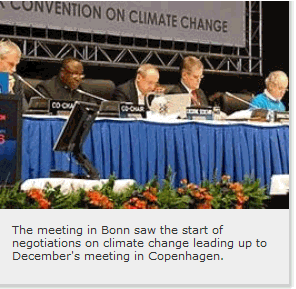
|
|
|
|
|
|
|
News & Views item - April 2009 |
![]() CSIRO
Scientists Speak Out Regarding Global Warming & First Preparatory Meeting for
the Copenhagen Climate-Change Summit Disappointing. (April 15, 2009)
CSIRO
Scientists Speak Out Regarding Global Warming & First Preparatory Meeting for
the Copenhagen Climate-Change Summit Disappointing. (April 15, 2009)
Three of CSIRO's top climatologists, John Church, an expert on sea level rise, Pep Canadell, who runs the global carbon project and has published on greenhouse gas releases, and Michael Raupach, the co-chairman of the same project who writes on greenhouse gas levels, have fronted the Senate inquiry into the Rudd Government's emissions trading scheme and opined according to Marian Wilkinson's report in The Sydney Morning Herald that "the Prime Minister's targets to cut greenhouse gas emissions will not achieve even a 'limited' level of protection against climate change and are 'much weaker' than the cuts developed countries need to make."
The three made it clear in their statements that they were not speaking for the organisation, which is precluded from commenting on government policy, but in a private capacity. Nevertheless, everyone listening was well aware of their expertise.
According to Ms Wilkinson their message was "the Government's plan to cut emissions by between 5 and 15 per cent below 2000 levels by 2020 and 60 per cent by 2050 is 'much weaker than required of developed nations'". In short: "The Australian targets will not achieve climate protection. Even if every nation on Earth adopts and succeeds in meeting Australian targets, global emissions would still be above a pathway consistent with long-term climate protection."
Meanwhile On 29 March, the first of three meetings in preparation for the Copenhagen climate-change summit in December began in Bonn, and while Todd Stern, the US special envoy on climate change, told the delegates that the Obama administration was "determined to make up for lost time", by the time the end of the meeting rolled around on April 8 NatureNews reports "many of the 2,000 delegates had the impression that there was still a lot of making up to do".
Stern, who holds a juris doctorate from Harvard Law School, told the 175 national delegations that the implementation of a national cap and trade programme could help cut US emissions by around 15% from current levels by 2020, and by 80% by 2050.
But could it be implemented politically, i.e. got through the US Congress -- Dr Stern was not prepared to predict. And NatureNews point out that "89 US senators recently voted to adopt a non-binding budget amendment stipulating that climate legislation should not increase gasoline or electricity prices".
Summarising the principal outcomes from this first preliminary conference Quirin Schiermeier writes:
Developing countries, including South Africa, India and China, told the Bonn meeting that they expect rich nations to commit to a 40% cut by 2020. Yvo de Boer, the executive secretary of the United Nations Framework Convention on Climate Change (UNFCCC), acknowledged that getting rich nations to agree to 25–40% emissions cuts by 2020 will be "very difficult".
Furthermore, Mohammad Al Sabban, an adviser to Saudi Arabia's Ministry for Petroleum and Mineral Resources, told reporters in Bonn: "We share the concern for climate change but at the same time we don't want to be a victim."
And then there is the funding to be made available to poorer countries to assist them to meet the reduction targets. At present US$172 million has been promised whereas: "Overall, development agencies talk of a need for sums at least 100 times greater, [i.e. ~US$20 billion]. 'There is still no clarity over the scale of financial and technological resources that would be available to developing countries,' said Shyam Saran, the Indian prime minister's special envoy on climate change."